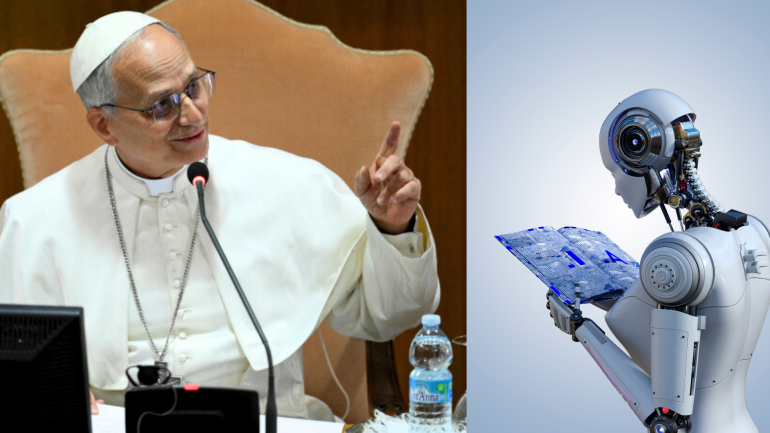Pope Leo takes on AI

Pope Leo's Gospel-centered approach insists that technology must serve humanity, not the reverse.
The Catholic Church finds itself at a pivotal intersection of faith and technology. Pope Leo XIV has swiftly identified artificial intelligence as a central challenge of his pontificate. As the first American pope and the 267th bishop of Rome, his focus on AI's ethical dimensions signals a significant shift in papal priorities that aligns remarkably with Catholic social teaching's historical concerns.
In his inaugural address to the College of Cardinals, Leo drew a deliberate parallel between our technological revolution and the industrial transformation that led to Pope Leo XIII's influential 1891 encyclical Rerum Novarum. His choice of papal name was no coincidence—it explicitly references his predecessor, who championed workers' rights during a profound economic disruption. Today's AI revolution presents similar challenges to human dignity, labor, and justice, requiring an equally thoughtful response.
As a Catholic educator witnessing AI's rapid integration into our society, I find Pope Leo's stance both timely and necessary. Too often, we embrace technological progress without sufficient ethical reflection, risking what Pope Francis called a "technological paradigm" that prioritizes efficiency over human flourishing.
The potential benefits of artificial intelligence are undeniable. AI systems already enhance healthcare diagnostics, identifying cancerous cells with greater accuracy than human physicians. They optimize resource distribution in food banks, ensuring supplies reach those most in need. Yet these advantages come with profound ethical questions that Catholic teaching is uniquely positioned to address.
Human dignity—the cornerstone of Catholic social thought—faces new threats in an AI-powered world. When algorithms determine who receives a mortgage, who gets hired, or who qualifies for parole, they risk reducing people to mere data points, contradicting the fundamental belief that each person is created in God's image. Privacy concerns multiply as facial recognition and surveillance capabilities expand, and algorithmic bias can perpetuate discrimination against vulnerable populations. Pope Leo's gospel-centered approach insists that technology must serve humanity, not the reverse.
Some technologists argue that restricting AI development impedes progress that could benefit humanity. However, this view overlooks how unexamined technological adoption can entrench existing power structures. The Church does not oppose innovation but insists on discernment—asking not just whether we can develop certain technologies but whether we should.
The transformation of labor markets presents another critical concern. Catholic teaching views work not merely as economic activity but as a vocation—a way to participate in creation and contribute to the common good. As AI automation displaces traditional jobs, particularly in manufacturing and transportation sectors, the Church advocates for solutions that protect workers' dignity. When autonomous trucks replace millions of drivers or AI systems take over customer service roles, we must ensure those workers find meaningful alternative employment through appropriate retraining programs and robust social safety nets.
Leo's vision heavily emphasizes justice and equity considerations. AI development risks exacerbating existing socioeconomic divides, with benefits flowing primarily to wealthy nations and corporations while disadvantaged communities fall further behind. In my mission community, I have watched rural parishes and missions struggle with limited broadband access, effectively excluding them from AI's educational and economic opportunities. This digital divide—unequal access to technology and its advantages—threatens to become an unbridgeable chasm without intentional intervention.
The impacts vary regionally as well. While Silicon Valley debates philosophical questions about AI consciousness, communities in the Global South worry about being excluded from AI development entirely. Pope Leo's American background may uniquely position him to bridge these divides, understanding both technological innovation and the need for global solidarity.
The Church's response draws deeply from Gospel values. Leo XIV continues the legacy of his predecessor Francis, who warned that unchecked technological advancement could worsen inequality. A truly Gospel-centered approach balances innovation with ethical guardrails, ensuring AI development remains grounded in human dignity and the common good.
This framework has practical implications for AI governance. It suggests the need for international cooperation on standards promoting transparency and accountability. It calls for diverse participation in AI development, including voices traditionally excluded from technological decision-making. And it emphasizes education that prepares people not just technically but ethically for an AI-powered future.
As Catholics, we can respond by advocating for ethical AI policies in our workplaces and government. We can support organizations developing AI applications serving disadvantaged communities. We can educate ourselves about algorithmic bias and demand transparency from companies using AI systems that affect our lives. Most importantly, we can foster communities where human connection remains central, recognizing that no algorithm can replace authentic relationships.
The parallels between today's challenges and those of the Industrial Revolution are striking: rapid technological change disrupting established patterns of work and social organization; the rise of fundamental questions about human dignity in an increasingly mechanized world; and the need for moral leadership to ensure technology served genuine human flourishing rather than narrow economic interests.
The Catholic Church, with its global reach and moral authority, is uniquely positioned to provide this leadership. Leo XIV's focus on AI reflects his understanding that technological progress must be guided by ethical principles. His Gospel-centered approach offers a framework for ensuring that artificial intelligence enhances rather than diminishes our common humanity.
As AI continues its rapid evolution, the Church's ancient wisdom provides a vital counterbalance to purely technical or economic perspectives. By emphasizing human dignity, just labor practices, and equitable access to technology's benefits, Pope Leo XIV offers a moral compass for navigating this new frontier. Artificial intelligence may transform how we work and live, but it must never alter what makes us fundamentally human—our inherent dignity as children of God.
(Dr. John Singarayar, a priest of the Society of the Divine Word from the Mumbai Province in western India, holds a doctorate in anthropology. He contributes regularly to journals and publications focusing on sociology, anthropology, tribal studies, spirituality, and mission.)








